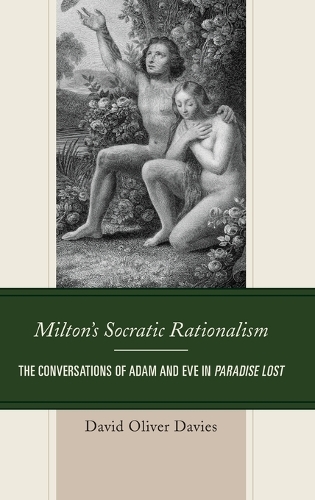
Milton's Socratic Rationalism: The Conversations of Adam and Eve in Paradise Lost
(Hardback)
Available Formats
Publishing Details
Milton's Socratic Rationalism: The Conversations of Adam and Eve in Paradise Lost
By (Author) David Oliver Davies
Bloomsbury Publishing PLC
Lexington Books
17th August 2017
United States
Classifications
Professional and Scholarly
Non Fiction
Literary studies: poetry and poets
Ancient Greek and Roman philosophy
Politics and government
821.4
Physical Properties
Hardback
196
Width 162mm, Height 240mm, Spine 22mm
472g
Description
The conversation of Adam and Eve in Paradise Lost, that most obvious of Milton's additions to the Biblical narrative, enacts the pair's inquiry into and discovery of the gift of their rational nature in a mode of discourse closely aligned to practices of Socrates in the dialogues of Plato and eponymous discourses of Xenophon. Adam and Eve both begin their life "much wondering where\ And what I was, whence thither brought and how. Their conjoint discoveries of each other's and their own nature in this talk Milton arranges for a in dialectical counterpoise to his persona's expressed task "to justify the ways of God to men." Like Xenophon's Socrates in the Memorabilia, Milton's persona indites those "ways of God" in terms most agreeable to his audience of "men"notions Aristotle calls "generally accepted opinions." Thus for Milton's "fit audience" Paradise Lost will present two waysthat address congenial to men per se, and a fit discourse attuned to their very own rational facultiesto understand "the ways of God to men." The interrogation of each way by its counterpart among the distinct audiences is the "great Argument" of the poem.
Reviews
The most compelling features of Miltons Socratic Rationalism are its thoughtful reconstruction of several intimate but nonetheless key moments in Paradise Lost, as well as its charting of Miltons reappropriation of ancient narrative, structure, and rhetorical devices.. . . . Miltons Socratic Rationalism is a thoughtful book which deserves the careful attention of scholars of Milton, ancient Greek political thought, literary criticism, and the history of political thought. * The Review of Politics *
Responding to a critic who said Milton had only blindness in common with Homer, G.E. Lessing said Paradise Lost was the finest epic since Homer. For, he argued, the range of Miltons inner vision was more valuable than his physical sight since it gained him mental freedom. In Miltons Socratic Rationalism, David Davies reveals how subtly Milton used his freedom. -- Paul Dowling, Canisius College
What, exactly, did Adam and Eve do when they ate fruit from the tree of the knowledge of good and evil, and what were the consequences John Milton put this question front and center in Paradise Lost; and, in this provocative monograph, David Davies makes a compelling case that the English poets take on these questions owes as much to Xenophon, Plato, and Aristotle as it does to the Book of Genesis. -- Paul A. Rahe, Hillsdale College
Author Bio
David Oliver Davies is associate professor of English and classics at the University of Dallas and director of the Ph.D. program in literature at the Institute of Philosophic Studies.
